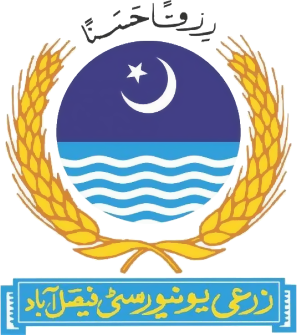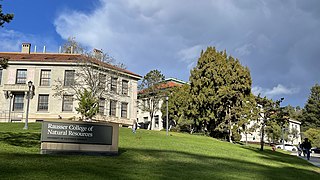
Washington State University is a public land-grant research university in Pullman, Washington, United States. Founded in 1890, WSU is also one of the oldest land-grant universities in the American West. With an undergraduate enrollment of 24,278 and a total enrollment of 28,581, it is the second largest institution for higher education in Washington state behind the University of Washington. It is classified among "R1: Doctoral Universities – Very high research activity".
Chungnam National University is one of ten Flagship Korean National Universities located in Daejeon, South Korea.

The Federal University of Juiz de Fora is a public research university in Brazil. Throughout its over 50 years of existence, the university has undergone significant growth, strengthening the quality of undergraduate and graduate education while maintaining its role as an agent of community development.

The University of Eswatini is the national university of Eswatini.

The University of Agriculture (UAF) is a public research university in Faisalabad, Pakistan. It is the largest university of Pakistan by area, with a covered area of 2,550 acres. It is ranked as a top university of Pakistan for Agriculture/Veterinary and is ranked among top ten Pakistani universities in general category

The Rausser College of Natural Resources (RCNR), or Rausser College, is the oldest college at the University of California, Berkeley and in the University of California system. Established in 1868 as the College of Agriculture under the federal Morrill Land-Grant Acts, CNR is the first state-run agricultural experiment station. The college is home to four internationally top-ranked academic departments: Agriculture and Resource Economics; Environmental Science, Policy, and Management; Nutritional Sciences and Toxicology; and Plant and Microbial Biology, and one interdisciplinary program, Energy and Resources Group. Since February 2020, it is named after former dean and distinguished professor emeritus Gordon Rausser after his landmark $50 million naming gift to the college.
Egerton University is a public university in Kenya. It is the oldest institution of higher education in Kenya.

The University of Florida Institute of Food and Agricultural Sciences (UF/IFAS) is a teaching, research and Extension scientific organization focused on agriculture and natural resources. It is a partnership of federal, state, and county governments that includes an Extension office in each of Florida's 67 counties, 12 off-campus research and education centers, five demonstration units, the University of Florida College of Agricultural and Life Sciences, three 4-H camps, portions of the UF College of Veterinary Medicine, the Florida Sea Grant program, the Emerging Pathogens Institute, the UF Water Institute and the UF Genetics Institute.

University of Kurdistan is the largest university in Iranian Kurdistan Province, located in the south of Sanandaj. The University of Kurdistan was ranked as the eighth top university in Iran in academic year 2007-2008 and was ranked as the first top developing university in Iran in academic year 2006–2007.
The College of Food, Agricultural and Natural Resource Sciences (CFANS) is one of seventeen colleges and professional schools at the University of Minnesota. The College offers 14 majors, 3 pre-major and pre-professional majors and 26 freestanding minors for undergraduate students and a variety of graduate study options that include master's, doctoral and joint degree programs.

The College of Natural Science (NatSci) at Michigan State University is home to 27 departments and programs in the biological, physical and mathematical sciences.

The University of Florida College of Agricultural and Life Sciences (CALS), founded in 1964, is a college of the University of Florida.
The College of Agriculture and Life Sciences is one of eight colleges at Virginia Tech with a three-part mission of learning, discovery, and engagement and it is one of the best agriculture programs in the nation. It has more than 3,100 undergraduate and graduate students in a dozen academic departments. In 2013, the National Science Foundation ranked Virginia Tech No. 6 in the country for agricultural research expenditures, much of which originated from the College of Agriculture and Life Sciences.
North Carolina State University's College of Agriculture and Life Sciences (CALS) is the fourth largest college in the university and one of the largest colleges of its kind in the nation, with nearly 3,400 students pursuing associate, bachelor's, master's and doctoral degrees and 1,300 on-campus and 700 off-campus faculty and staff members.
The University of Maryland College of Agriculture and Natural Resources is the agricultural and environmental sciences college of the University of Maryland and operates the Maryland Sea Grant College in cooperation with the University of Maryland Center for Environmental Science and the National Oceanic and Atmospheric Administration.
The Carson College of Business is the business school of Washington State University in Pullman, Washington. Established in 1963, it is one of the largest of the ten colleges in WSU.
The Colorado State University College of Agricultural Sciences includes five academic departments and offers nine undergraduate majors with many concentration options as well as multiple graduate degree programs. People in the College of Agricultural Sciences lead research and design projects in food production, security, and safety, ecosystem health, landscape design, and human well-being. They also provide extension and participate in engagement in agricultural sciences and landscape architecture.

The Lilongwe University of Agriculture and Natural Resources (LUANAR) is a university outside Lilongwe, Malawi. It was formed in 2011 by a merger between Bunda College of Agriculture of the University of Malawi and Natural Resources College (NRC).
Sue Brannon Clark is an environmental radiochemist. Since receiving her doctorate in inorganic and radiochemistry from Florida State University in 1989, Clark has worked at Washington State University where she leads a research team on the chemistry and chemical engineering of processing nuclear materials. She has also held various leadership roles at WSU, including serving as interim vice chancellor for academic affairs and interim dean of the college of sciences.

The University of Connecticut's College of Agriculture, Health, and Natural Resources (CAHNR) is the oldest of UConn's fourteen colleges, and teaches a wide range of subjects. It is the oldest agricultural school in Connecticut, originally established with two purposes, conducting agriculture research and teaching practical skills to modernize farming. The college describes its mission as working "toward a global sustainable future." To that end, besides conducting research and teaching, the college's faculty also work together with Connecticut communities on projects related to food systems, agriculture, human health, nutrition and physical activity, and environmental science.













